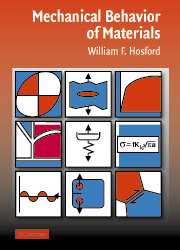Book contents
- Frontmatter
- Contents
- Preface
- Note to the Reader
- 1 Stress and Strain
- 2 Elasticity
- 3 Tensile Testing
- 4 Other Tests of Plastic Behavior
- 5 Strain-Hardening of Metals
- 6 Plasticity Theory
- 7 Strain-Rate and Temperature Dependence of Flow Stress
- 8 Slip
- 9 Dislocation Geometry and Energy
- 10 Dislocation Mechanics
- 11 Mechanical Twinning and Martensitic Shear
- 12 Hardening Mechanisms in Metals
- 13 Ductility and Fracture
- 14 Fracture Mechanics
- 15 Viscoelasticity
- 16 Creep and Stress Rupture
- 17 Fatigue
- 18 Residual Stresses
- 19 Ceramics and Glasses
- 20 Polymers
- 21 Composites
- 22 Mechanical Working
- Appendix A Miller Indices
- Appendix B Stereographic Representation of Orientations
- Index
17 - Fatigue
Published online by Cambridge University Press: 05 June 2012
- Frontmatter
- Contents
- Preface
- Note to the Reader
- 1 Stress and Strain
- 2 Elasticity
- 3 Tensile Testing
- 4 Other Tests of Plastic Behavior
- 5 Strain-Hardening of Metals
- 6 Plasticity Theory
- 7 Strain-Rate and Temperature Dependence of Flow Stress
- 8 Slip
- 9 Dislocation Geometry and Energy
- 10 Dislocation Mechanics
- 11 Mechanical Twinning and Martensitic Shear
- 12 Hardening Mechanisms in Metals
- 13 Ductility and Fracture
- 14 Fracture Mechanics
- 15 Viscoelasticity
- 16 Creep and Stress Rupture
- 17 Fatigue
- 18 Residual Stresses
- 19 Ceramics and Glasses
- 20 Polymers
- 21 Composites
- 22 Mechanical Working
- Appendix A Miller Indices
- Appendix B Stereographic Representation of Orientations
- Index
Summary
Introduction
It has been estimated that 90% of all service failures of metal parts are caused by fatigue. A fatigue failure is one that occurs under cyclic or alternating stress of an amplitude that would not cause failure if applied only once. Aircraft are particularly sensitive to fatigue. Automobile parts such as axles, transmission parts, and suspension systems may fail by fatigue. Turbine blades, bridges, and ships are other examples. Fatigue requires cyclic loading, tensile stresses, and plastic strain on each cycle. If any of these are missing, there will be no failure. The fact that a material fails after a number of cycles indicates that some permanent change must occur on every cycle. Each cycle must produce some plastic deformation, even though it may be very small. Metals and polymers fail by fatigue. Fatigue failures of ceramics are rare because there seldom is plastic deformation.
There are three stages of fatigue. The first is nucleation of a crack by small amounts of inhomogeneous plastic deformation at a microscopic level. The second is the slow growth of these cracks by cyclic stressing. Finally sudden fracture occurs when the cracks reach a critical size.
Surface observations
Often visual examination of a fatigue fracture surface will reveal clamshell or beach markings as shown in Figure 17.1. These marks indicate the position of the crack front at some stage during the fatigue life. The initiation site of the crack can easily be located by examining these marks.
- Type
- Chapter
- Information
- Mechanical Behavior of Materials , pp. 279 - 307Publisher: Cambridge University PressPrint publication year: 2005
- 3
- Cited by



